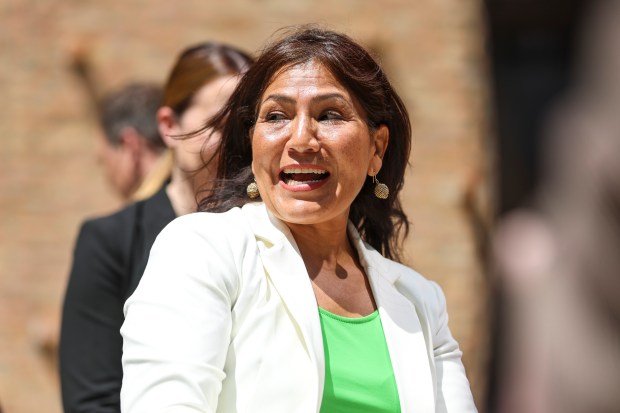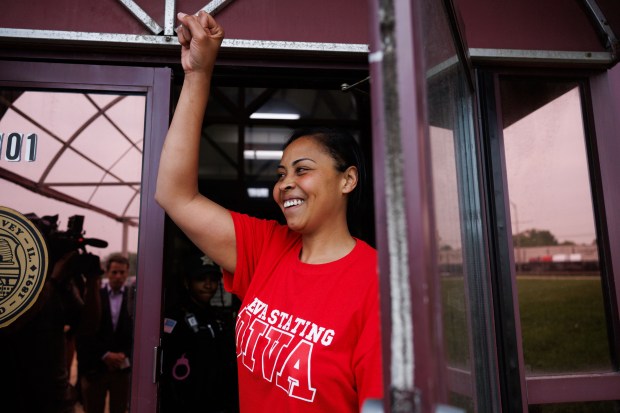Some summer campers, golfers and bowlers would see fee hikes next year under the Chicago Park District’s proposed 2025 budget — but property taxpayers will be spared.
The loss of Pitchfork’s annual weekend festival in Union Park only represents a drop in the bucket that district leaders are hopeful will be filled by another event, but uncertainty lingers over two main tenants at the park district’s Soldier Field.
The fresh fees included in the proposed 2025 budget would apply to bowling, roller skating, harbor, parking and green fees at district golf courses. Day camp rates will also climb back to pre-pandemic levels, but only for some programs, General Superintendent and CEO Rosa Escareño told the Tribune Tuesday ahead of her budget presentation to the district’s board.
“We’re looking at this through an equitable lens, so some of the camps that can absorb and be brought up to the 2019 levels, they will,” she said. In areas with lower-income families, “those will not rise yet.”
The district’s property tax levy will increase by $5.3 million, which captures new properties that were built and property values unlocked with the expiration of special taxing districts. In all, the levy will grow to $324.7 million, but the rate won’t climb for taxpayers.
The district will also get $21.5 million in revenues under Mayor Brandon Johnson’s plan to surplus a record $570 million from Chicago’s tax increment financing districts.
Between Chicago Bears and Fire games and next year’s Oasis concert, the district expects to bring in $56.8 million in gross revenues from Soldier Field, plus $31.2 million from harbor fees and $10.1 million from golf courses.
While those Soldier Field revenues are “essential” to the district, Escareño declined to elaborate on the ongoing intrigue — and potential exits — of the Bears and the Fire.
Chicago Fire owner Joe Mansueto is potentially looking at either The 78 or Lincoln Yards to build a new 25,000 seat stadium for the soccer team, Crain’s reported this week. The team’s lease at Soldier Field ends next year.
While their lease is not up until 2033, the Bears are continuing negotiations for a new home in Arlington Heights, a beefed up dome near the current Soldier Field, or setting up shop at the former Michael Reese site.
“Our goal is to ensure that our strong revenues remain and continue into the future so that we can continue to support the vibrancy of the district,” Escareño said. “Our focus has been around making sure that we are continuing to make them successful, continuing to support the benefits that exist at Soldier Field, to make sure that the experience for event-goers is strong… Right now there’s a lot of stories out there and I think what we’re focused on is just continuing to have a strong relationship and partnership with these sports teams.”
The Obama Presidential Center will also near completion in Jackson Park next year. Its athletic center should be finished in 2025, with the museum opening close behind in the spring of 2026. Though plans to combine nearby park district-owned golf courses into a Tiger Woods designed PGA-level course have stalled, Escareño said they are not dead.
“We haven’t had a conversation recently, but I know that there’s still strong interest in conversations about the future of beautifying the Jackson Park Golf Course, so yes we stand ready to continue those conversations,” she said. “I have just confirmed there’s still interest in this future development, and so as a team we haven’t met for a little while, but we’re keeping that door open, and no I’ve not heard that this is over.”
Losing Pitchfork, however, “was kind of a surprise,” she said. It’s not only a blow to the summer schedule, but means the district will miss out on over $200,000 in permit fees. “There’s a loss there. What is important, though: we always keep our doors open. We know there’s a high level of interest in operating in Chicago… we would love to re-engage with Pitchfork, but that is a business decision on their end.”
The budget also includes the cost of a new contract with SEIU Local 73, the union that represents about two thirds of district workers like instructors, attendants, landscapers and security. The deal, reached in the spring after strike threats, will bring the lowest hourly employee pay before the deal — $16 — up to $21 per hour next year and will hike monthly employees’ wages by 4%.
After a national lifeguard shortage and a sexual harassment scandal stymied efforts to open city pools and beaches mid-pandemic, that higher pay and training programs helped ensure lifeguard staffing was back on track this past summer. “I have teams already working on making sure that we have lifeguard trainings already happening in November and December, so we are working already to make sure that the next summer is going to be as successful, if not more so, than the last year,” Escareño said.
The district, whose pension funds were at risk of insolvency as soon as 2028, recently climbed a steep funding ramp to ensure its pension contributions matched actuarial calculations that would pay for long term liabilities.
Thanks to big and unexpected corporate income tax receipts from the state in past years, the district made a lump sum payment that helped stem losses. Pension costs are relatively level for next year, climbing from $56.9 to $59.7 million.
A final board vote on the budget is expected by Dec. 13.




